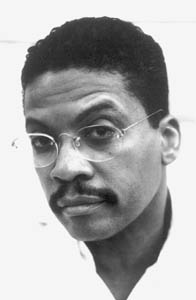![[Metroactive Music]](/music/gifs/music468.gif)
[ Music Index | San Jose | Metroactive Central | Archives ]
Photograph by James Minchin
One For All
Jazz greats Wayne Shorter and Herbie Hancock hook up for Kuumbwa anniversary concert
By Val Hall
ANY JAZZ AFICIONADO will know the names Wayne Shorter and Herbie Hancock. The playful and introspective musical relationship between these masters will certainly be the focus of their upcoming duo performance at the Santa Cruz Civic Auditorium on Nov. 16 (the last in Kuumbwa's 25th Anniversary series of concerts).
Wayne Shorter's tunes are singable, yet verge on the bizarre. His melodic lines seem to float carefree above a maelstrom of challenging and complex harmonic progressions. His improvisations never fall back on memorized "licks"; he holds no preplanned pretensions. Of Hancock, Miles Davis once said, "Herbie was the step after Bud Powell and Thelonious Monk, and I haven't heard anybody yet who has come after him."
Pianist Hancock's muscularity and more earthy sensibility offer a perfect counterpoint to soprano saxophonist Shorter's grace and minimalistic approach.
Hancock and Shorter's first tour as a duo took place in 1997 in support of their Herbie Hancock & Wayne Shorter Duets 1+1 record for Verve. The album, which became one of the most closely examined acoustic jazz releases that year, is a beautiful example of the uncanny communicative and improvisatory powers these musicians possess.
This intuitive relationship was kindled and nurtured in the second great Miles Davis quintet of 1963-68, in which Herbie and Wayne were key creative forces. Shorter explains: "Whatever made those recordings unique unto themselves had to do with being prepared to work on a one-on-one basis [and] that experience enabled us to be like an extract from the quintet, to do duets based on a lot of things we had lived through together like a family."
Hancock adds that they "would try to be sensitive to recognizing the concept more than the example. Then we could be improvising off that concept, rather than just improvising off the composition. Wayne and I did it that way on [the 1+1] record."
SHORTER BEGAN his career in New York (of course) and was good friends with John Coltrane, who encouraged the younger saxophonist to "scramble them eggs." His first major gig was a five-year stint as tenor frontman and musical director for Art Blakey and the Jazz Messengers, which had the effect of bringing Shorter's oblique, intellectual and ethereal sound more "inside."
After this grounding experience in traditional jazz, Shorter joined the Miles Davis Quintet. In 1970, he formed the groundbreaking, overly prolific fusion outfit Weather Report, with Joe Zawinul and Miroslav Vitous.
Hancock was a classical piano prodigy who had performed with the Chicago Symphony before his 12th birthday. From these auspicious beginnings, Hancock has shaped the development of acoustic/electronic jazz and R&B for more than 30 years.
After working with Donald Byrd and Dexter Gordon, Herbie signed on with the Miles Davis Quintet with Wayne, where Miles thought of him as the "anchor" of the group. From there Hancock formed the extremely funky and bestselling Headhunters, which set the all-time standard for electronic funk-fusion.
Hancock is one of the most successful jazz musicians in history: winning five Grammys and one Academy Award (for the 1987 film score to 'Round Midnight) are just the most obvious of his accomplishments.
Recently Herbie has been focused on pop projects such as Dis Is Da Drum, a disappointingly watered-down hip-hop/electronic jazz-funk record. Somewhat more rewarding is The New Standard, an album of pop covers (from Nirvana to The Artist Formerly Known As) by some of the most impressive names in jazz, including Michael Brecker, Jack DeJohnette and Dave Holland.
It will be sublime to see both these legendary artists break from the sequencer and drum machine to explore a more organic classical/jazz fusion.
[ San Jose | Metroactive Central | Archives ]
![]()
 Earthy Sensibility: Pianist Herbie Hancock (pictured) offers a perfect counterpoint to the minimalist grace of Wayne Shorter.
Earthy Sensibility: Pianist Herbie Hancock (pictured) offers a perfect counterpoint to the minimalist grace of Wayne Shorter.
Wayne Shorter and Herbie Hancock perform as part of the Kuumbwa Jazz Center 25th Anniversary Concert Series on Thursday (Nov. 16) at 8pm at the Santa Cruz Civic Auditorium. Tickets are $35/$50. (831.420.5260)
From the November 9-15, 2000 issue of Metro, Silicon Valley's Weekly Newspaper.